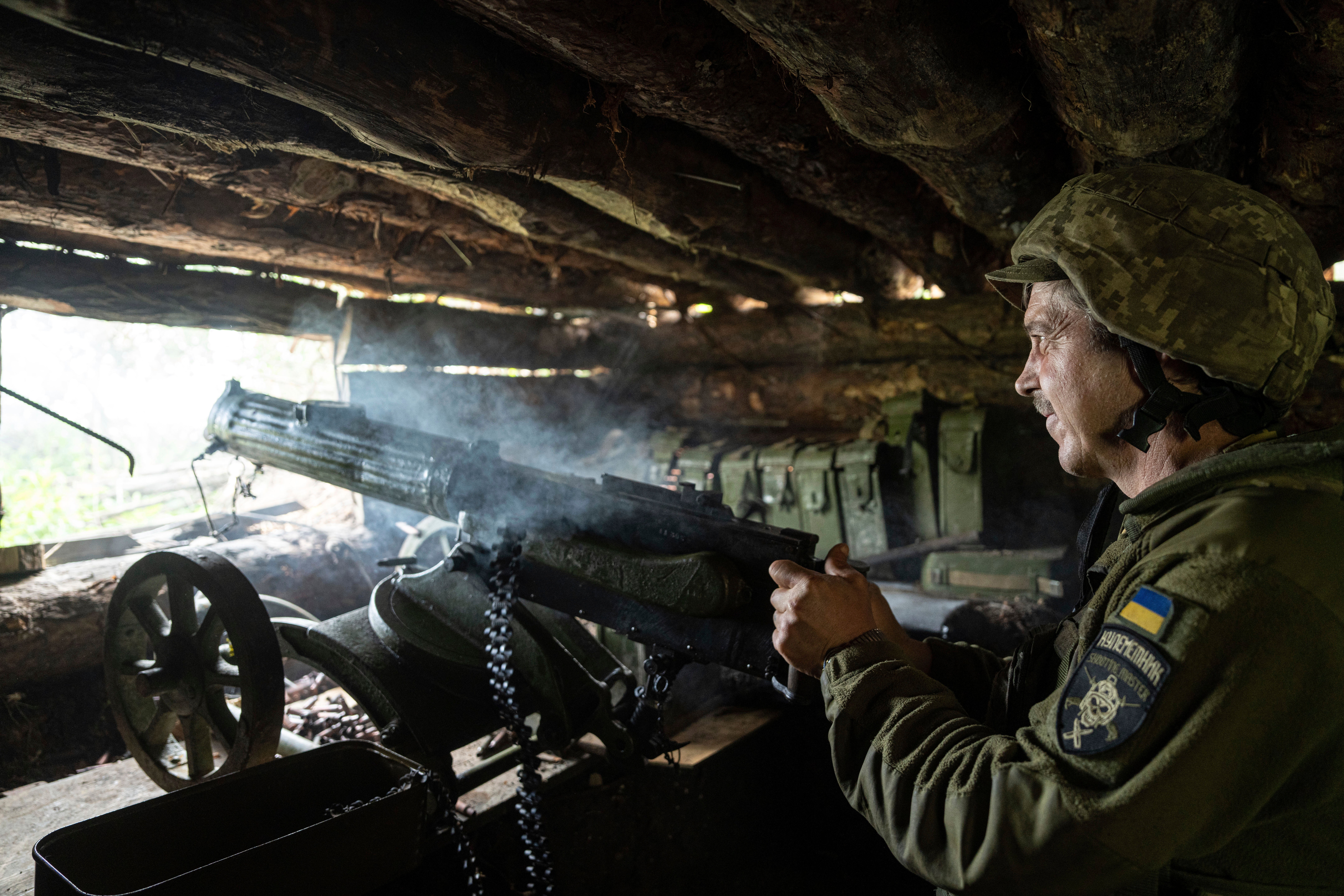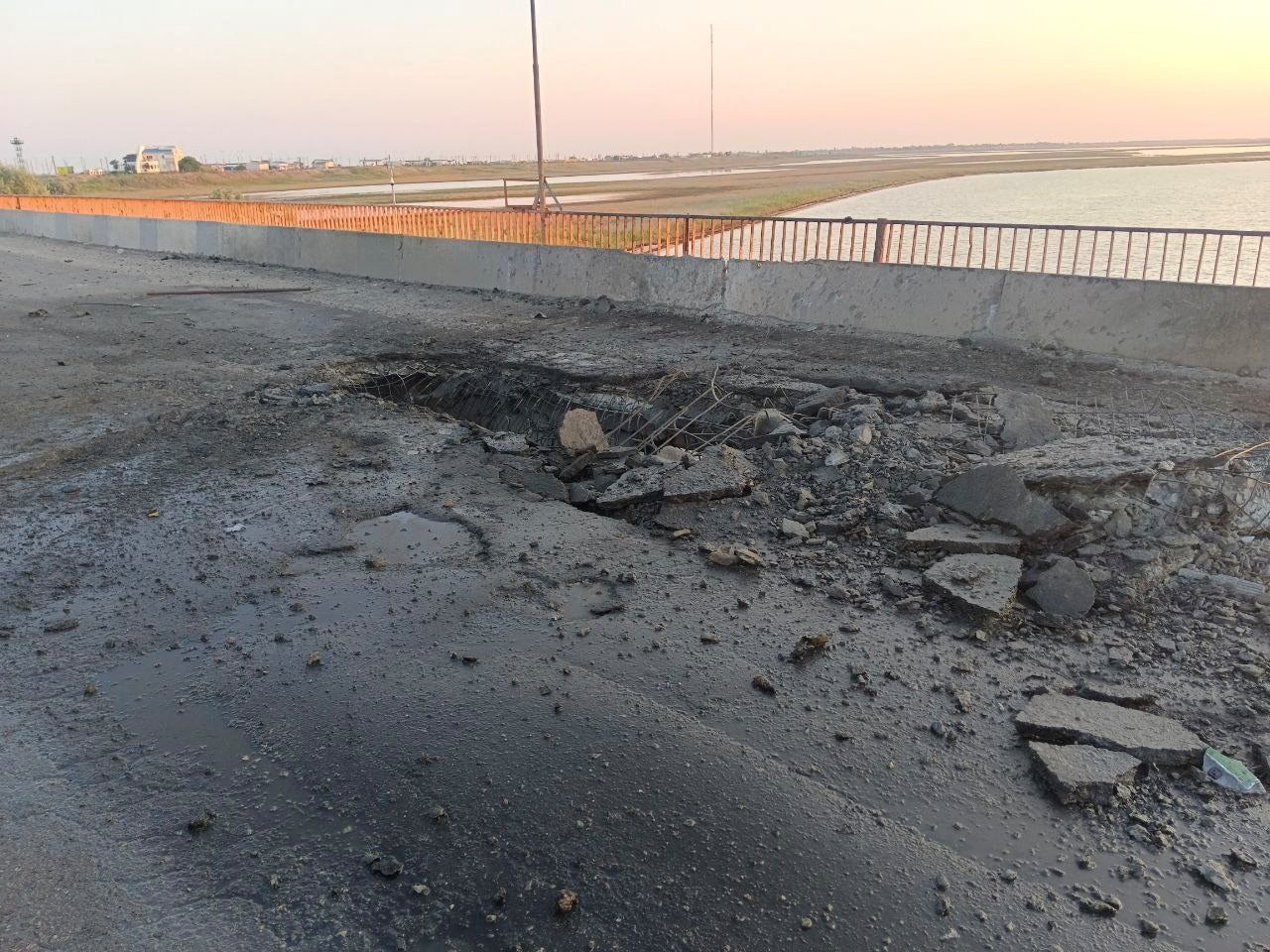Zelensky accuses Russia of plotting ‘radiation leak’ attack at Zaporizhzhia nuclear plant
Warning comes as bridge connecting Russian-held Crimea and the Ukrainian mainland is damaged in strike

Your support helps us to tell the story
From reproductive rights to climate change to Big Tech, The Independent is on the ground when the story is developing. Whether it's investigating the financials of Elon Musk's pro-Trump PAC or producing our latest documentary, 'The A Word', which shines a light on the American women fighting for reproductive rights, we know how important it is to parse out the facts from the messaging.
At such a critical moment in US history, we need reporters on the ground. Your donation allows us to keep sending journalists to speak to both sides of the story.
The Independent is trusted by Americans across the entire political spectrum. And unlike many other quality news outlets, we choose not to lock Americans out of our reporting and analysis with paywalls. We believe quality journalism should be available to everyone, paid for by those who can afford it.
Your support makes all the difference.Ukraine has new evidence Russia is plotting a “terrorist” attack on the Zaporizhzhia power plant that will result in a radiation leak, President Volodymyr Zelensky has warned.
The Kremlin dismissed the allegation as "another lie", and said a team of United Nations nuclear inspectors had visited the plant and rated everything highly.
In a video statement, Mr Zelensky said that Kyiv had received intelligence about an attack on the facility – the largest nuclear power plant in Europe – which is currently occupied by Russia.
He added that they had shared the information with partners including the United States China, Europe, Brazil and India.
"Intelligence has received information that Russia is considering the scenario of a terrorist act at the Zaporizhzhia nuclear plant – a terrorist act with radiation leakage,” he said.
“Radiation has no state borders. Whomever it will hit is deterred only by the direction of the wind,” he added.
“This time it should not be like Kakhovka,” he said, referring to the hydroelectric dam Kyiv says Moscow blew up earlier this month.
“The world has been warned, so the world can and must act.”
Mr Zelensky did not say what evidence Ukraine based this assertion on. This week the country’s military intelligence chief accused Russia of mining the cooling pool used to keep reactors at the plant cool.
The six-reactor complex has been under occupation since shortly after Moscow's forces invaded Ukraine in February last year.

The two sides have accused each other of shelling the vast facility, and international efforts to establish a demilitarised zone around it have failed so far.
Ukrainian officials have told The Independent that Russia is using “scorched earth tactics” to scupper a new Ukrainian counteroffensive and may have no qualms in targeting the Zaporizhzhia power plant if backed into a corner.
Kyiv raised the alarm after the Kakhovka dam blew up on 6 June, pouring millions of cubic metres of water across southern Ukraine – an act it blamed on Russia. The torrent of water submerged whole towns and villages and left tens of thousands of people without access to piped water. Moscow has denied the accusations.
“We know the Russians can do this, we knew they could blow up the Kakhovka dam and we know they could target the [Zaporizhzhia] power plant, “ Taras Tyshchenko, head of the centre for disease control and prevention in Zaporizhzhia city, told The Independent.
At the Ministry of Health facility, Tyshchenko’s teams are already testing the air and water for radiation and disease after the dam explosion.
Mr Tyshcehno said the same teams were prepared for the worst-case scenario: three rounds of training had already been held in case the nuclear power plant is targeted.
“This is a very serious threat, the scale of which cannot be predicted in advance,” he said.
“This incident will not be a local or even a national one, it is a global incident. It will have a significant impact on the environment not only in Zaporizhzhia region, Dnipro region, or in Ukraine as a whole.

“This will be an incident that can definitely affect all our neighbouring countries, especially those that have access to the Black Sea.”
He said a full-scale evacuation of the area under Ukrainian control surrounding the nuclear power plant could be triggered within 15 minutes of the first reports of an explosion.
After that, inhabitants of the impacted area would be instructed to take cover. Potassium iodide tablets (which can help with radiation poisoning) had been distributed in September. Emergency crews would then test the environment for safe routes out.
“Why they are doing this only Russia knows,” Mr Tyshcehno added.
“The first people who will be hit will be their own units and the people supporting them nearby the plant.”
Ukraine suffered the world's worst nuclear accident in 1986 when it was part of the Soviet Union. Clouds of radioactive material spread across much of Europe after an explosion and fire at the Chernobyl nuclear power plant.

Elsewhere, one of the few bridges linking the Crimean Peninsula with the Ukrainian mainland was struck early on Thursday, Russian-backed officials said, cutting one of the main supply routes for Russian forces in southern Ukraine.
The two parallel Chonhar bridges were both damaged but no one was hurt, said the Russian-installed governor in occupied Kherson, Vladimir Saldo – adding that it was likely long-range Storm Shadow missiles supplied by Britain were used. The Russian state RIA news agency later quoted a spokesman for military investigators as saying that markings found on the remains of one of the missiles suggested it had been made in France.
Ukrainian authorities did not immediately comment, and typically do not confirm specific attacks. But Kyiv has said it wants to retake Crimea – annexed by Moscow in 2014 – and drive all Russian forces from its territory.
In its latest update on the fighting across the country, Ukraine's military reported “partial success” in the southeast and east on Thursday. Addressing the overall progress of Kyiv's counteroffensive during the Ukraine Recovery Conference in London, Ukrainian prime minister Denys Shmyhal said that Ukraine's army had advanced seven kilometres and retaken territory that included eight villages during the last two weeks.
“As the president of Ukraine [has] said, the counteroffensive is not a Hollywood movie. It's not an easy walk," Mr Shmyhal said. "The counteroffensive is a number of military operations. Sometimes it's offensive, sometimes it's defensive. Sometimes it could be tactical pauses. Unfortunately, during our preparation for this counteroffensive, Russians were preparing too. So there is so much minefields, which really make it slower.”
“We will do very smart offensive operations and because of this it will take time,” the prime minister said. “We all should have patience and we will see results.”
Join our commenting forum
Join thought-provoking conversations, follow other Independent readers and see their replies
28Comments